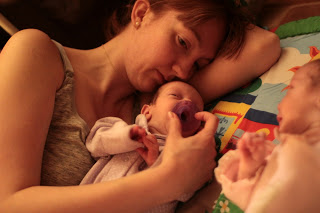A little over a year ago, I found myself with two tiny 4-month-olds and exhaustion beyond anything comparable. I was recovering from one of the most traumatic events of my life. I had these beautiful blessings. Their health was improving. The scary parts were over. But still, something didn’t feel right with me. During middle-of-the-night nursing sessions I began doing Google searches for postpartum depression. Part of me felt guilt over this. I wasn’t depressed. I was just … unsure. I didn’t have the classic signs of postpartum depression. But I was suffering. And I needed help.
There are several types of postpartum depression. In the past, these have all been lumped together under the same title: depression. This is confusing for many moms because like I said, I wasn’t depressed. Further research, though, taught me that so much can happen after the delivery of a baby that your body acts in pretty irrational ways. Postpartum anxiety, postpartum traumatic stress disorder and postpartum OCD are all subcategories of postpartum depression.
BabyCenter breaks the signs of postpartum depression into a few categories. The website has a lot of good links and information to help get you started. In summary, though, if you have any or all of the following symptoms or if you simply do not feel like yourself, talk to a doctor you trust or seek help from a friend or family member who can contact a professional for you.
· Unexplained irritability (think PMS on steroids)
· Lack of concentration
· Overwhelming anxiety
· Anger, sadness, excessive crying
· Hopelessness and helplessness
· Insomnia, exhaustion, faintness, or increased adrenaline
· Excessive weight loss due to malnutrition or poor eating
· Excessive weight gain due to stress eating or binging
Treating postpartum depression is an individual process. It wouldn’t be fair for me to tell readers how to get treatment because my PPD may not have had the same triggers and results as yours. Know though, that you have options. Part of why I suffered so long was an internal struggle with asking for help. I didn’t want my doctor to just prescribe some medication to numb me up and go on my way. There are cases of postpartum depression where medicine as a form of treatment is recommended and necessary. It is important for moms who need to take this route to not feel judged or guilty. You did not cause your postpartum depression and you should not have to live in pain avoiding assistance.
I discussed medication with my provider and in my individual situation, it was determined counseling sessions would be a better place to start. I spoke to a therapist for four months for weekly and then biweekly appointments. She taught me new ways of controlling my thoughts. We discussed healthy alternatives to deal with my stress and finding ways to relax. We talked about diet and exercise. We took a holistic approach to healing me from postpartum depression.
One year later, I am happy. I thought I was happy before, but the truth is, I wasn’t. I know who I am now and I am no longer in a fog. If I can reach out to just one person with this post, then this has been worth it. That’s all it takes is for one person who has been there to tell you it’s going to be okay. Because it is.
First time here? Like Mumbling Mommy on Facebook to continue the conversation!
Let’s connect on social media too:
Mumbling Mommy on Facebook
Mumbling Mommy on Twitter
Mumbling Mommy on Pinterest
Category: BabiesTags: counseling









